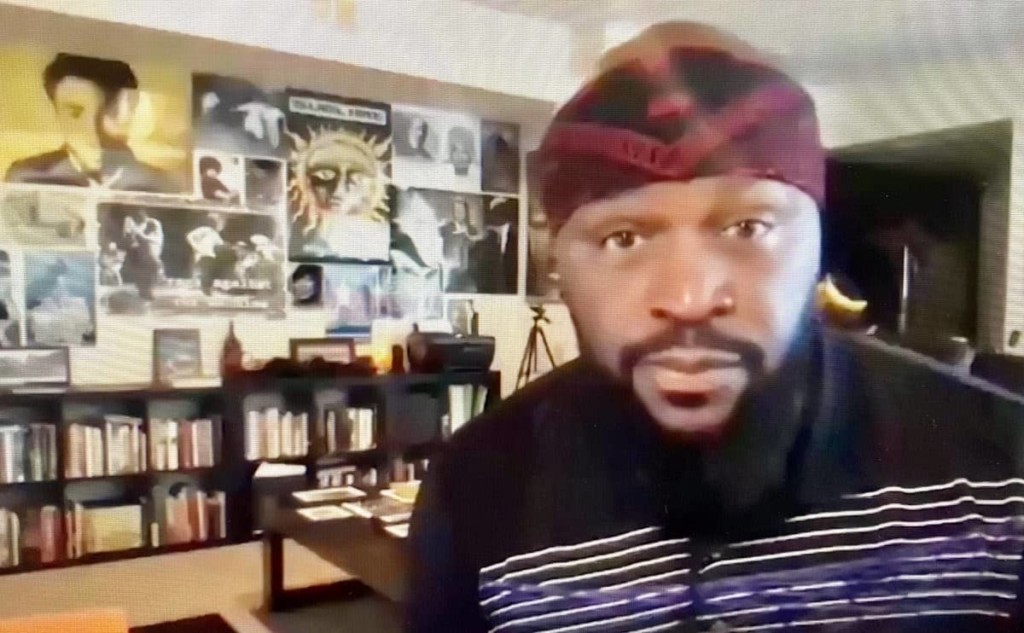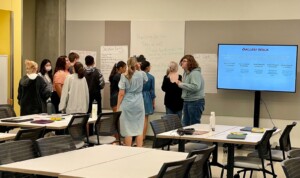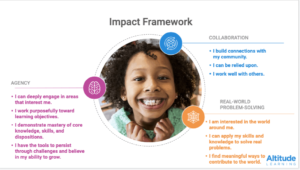Creating The New Way Forward

Last week, a few thousand of us gathered to consider A New Way Forward. Designed to explore new ways to support all learners, the virtual dialog occurred 60 hours after a Minneapolis police officer murdered George Floyd, an unarmed Black man. The path forward conversation occurred in the middle of a pandemic that has amplified the systemic oppression and racism that continues to disproportionately kill and economically bankrupt marginalized communities, especially the working poor and people of color.
Dr. Kaleb Rashad opened the dialog by talking about the challenge of raising Black boys in a time when it is so obvious that the justice and economic systems are rigged against them. “How to raise young men in an era of blatant white supremacy and capitalism by any means?”
It’s also clear, particularly this spring, that a learner-centered ecosystem is also one where all young people have equal access to justice, digital connectivity, and economic opportunity.
“How do we respond today to kids who are in crisis?” asked Dr. Tony Wagner. For one who came of age in the 60s, an era of crisis, he said, “Carpe diem, it’s time to take back what we want to be held accountable for.”
“I want to do the work for the people that came before me,” said Rashad. “I want to lead with humility– acknowledging I don’t know it all.”
A new way forward includes “Living in harmony with the planet,” said Rashad, and “Caring for community.”
Watch The Keynote:
Leading A New Way Forward
Rashad said there are 3 things to stop doing in education, NOW:
3 Things to Stop Doing in Education, NOW:
Stop MISPREDICTING what Ss are capable of doing.
Stop TRACKING Ss based on perceived academic ability.
Stop SEGREGATING subjects, Ss from each other & Ss from their world. #anewwayforward pic.twitter.com/IliLCzvure— Dr. Kaleb Rashad, director of design + justice🔥 (@kalebrashad) May 28, 2020
In a breakout on transformational leadership, Superintendent Susan Enfield described the Promise of Highline Public Schools: Every student known by name, strength and need, and graduates prepared for the future they choose.
Vince Sheffield, Deputy Superintendent in El Paso, described their whole child commitment and shift away from a test prep curriculum to active learning.
Watch The Session:
The New Way Forward
Kelly Young, President of Education Reimagined, and Tom Vander Ark closed out the summit with four observations.
Next year will be challenging and complicated. As we wrap a difficult and unexpected close to the school year, decisions will be made in the next three months that will chart the way forward. They will need to include more robust plans for continuity of learning as well as provisions for the health of students and staff members. It’s also likely that these complex decisions will be made assuming significant budget cuts.
It won’t be the same. While there is new flexibility and need to move in a more learner-centered direction, many system administrators will default to familiar routinized approaches. The 90 next days will chart the way forward. It won’t be the same. It will either be more learner-centered or it won’t. It depends on what we do next.
It’s time for leadership. We each have more influence than we know. We each have a near term opportunity to help chart the course for our classroom, school, system and state. There are routinized, taken for granted ways of doing just about everything in education — we group young people by age, we assign adults and kids to a single building and then limit the learning to those people, we divide learning up into subjects, we assume learning is linear and better broken apart. This is a moment when we have a chance to repurpose the assets of districts and the broader community into a coherent system that supports equitable, rich, meaningful learning and enables our young people to contribute to their community and world.
Let’s keep talking, let’s keep pushing, let’s keep reimagining what education could be. Your leadership will be decisive in bending the system towards learner-centered.
It’s time for a learner-centered ecosystem. We all know learner-centered experiences and learner-centered schools, but how would a learner-centered ecosystem work? This pandemic brought to a close 30 years of testing and accountability as the framework for school in America. It’s time for a new framework, a learner-centered framework (what Tony Wagner calls it Accountability 2.0) that supports engaging, authentic learning. The new framework will also update graduation requirements, how we credential, how we prepare teachers and how we fund schools.
Looking Forward
The next conversation we want to have is about a new learner-centered framework and ecosystem. Let’s launch a campaign and hold another forum to articulate this learner-centered framework. A framework that reckons with systemic racism and inequity in education and beyond, that supports healing for children and adults that suffer from the trauma of our systemic circumstances, that gives space for the courage to build community in authentic ways so each child and adult can be seen, loved and affirmed as who they are and for what they want and need.
This work necessitates reciprocity to each other and holds accountable people, resources and structures. If you’ve been thinking about this, we’d love to hear from you and would like to further encourage the participation of educators, leaders and community partners of color to share their voices and stories with us.
As Joe Erpelding said to open the summit: “The future is a place we create.”
For more, see:
- Podcast: Tony Wagner on Learning By Heart
- Making the City the Text at High Tech High
- Getting Through: Leading Through And To A New Generation Of Learning Systems
- Getting Clearer: We Are All American Sons
Stay in-the-know with innovations in learning by signing up for the weekly Smart Update.





DeBora L'T. Mapp, EdD
I appreciate your informational resources! I have written a series of books that may be useful to your organization. The book series is #SAUCE Speak and Act on usually Unspoken but connected topics to Challenge Expectations. The books 5 include:
1) Our Children and Future: Lessons in Family and School Engagement (a holistic guide that has been split into 3 shorter books for busy parents and families- 2) Making Sense of Today: Connect for a Better Future; 3) Prepare Our Children for Their World: Clues from Birth through Graduation and 4) Prepare Our Children Spiral bound Companion Journal). 5) Efficacy, Engagement and Hope for 21st Century Schools. The first 4 books are going through a final editing, and I am looking for reviewers for them. The 5th book is a rewrite of my dissertation and will be available later this summer. Thank you! Be safe and well as you continuously learn, Dr. D. Mapp